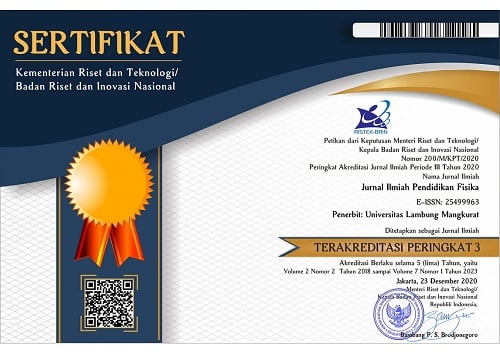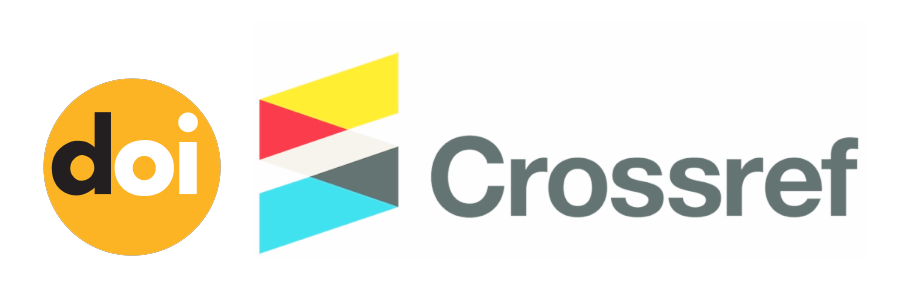Teachers’ Perspectives on the Learning Management System (LMS) in Physics Subject: A Preliminary Study
Abstract
This paper aims to explore the teachers’ perspectives on the LMS in the physics learning process. The research was conducted using a descriptive quantitative method. A total of 31 science and physics teachers participated as the research sample which was determined by purposive sampling technique. Data collection was carried out using a mixed questionnaire consisting of 14 questions which were then distributed online using Google Form. Based on the findings, learning using the LMS offers many advantages, but the findings also show that there are deficiencies in terms of the internet network which has an impact on delays in incoming information to students. Then, the results of the analysis show that 100% of science and physics teachers need the application and development of LMS to make it easier for them to convey physics material so that it is more flexible, effective, and efficient. The LMS expected by the physics teacher contains features such as video conferencing, uploading files/tasks, discussion forms, quizzes, and absences, then the LMS is user-friendly, can be used without the internet, and manages grades automatically. Based on the results of data analysis, it can be concluded that teachers seek the development and implementation of LMS in physics learning.
Keywords
Full Text:
PDFReferences
Ahmad, A. (2021). Prokrastinasi akademik dalam menulis skripsi pada mahasiswa program studi pendidikan teknik informatika dan komputer FT UNM. Universitas Negeri Makassar.
Al-Furqansyah, Y. A., Yuliani, H., & Syar, N. I. (2021). Analisis kebutuhan pengembangan media e- learning berbasis telegram pada pokok bahasan hukum newton di smp. Jurnal Ilmiah Pendidikan Fisika, 5(1), 62–69. https://doi.org/10.20527/jipf.v5i1.2718
Andriani, N., Benni, B., Zulherman, Z., & Sudirman, S. (2018). Development of physical and earth and space science content problems based on pisa in class viii junior high school. Kasuari: Physics Education Journal (KPEJ) Universitas Papua, 1(2), 65–72.
Astuti, P., & Febrian, F. (2019). Blended learning syarah: Bagaimana penerapan dan persepsi mahasiswa. Jurnal Gantang, 4(2), 111–119. https://doi.org/10.31629/jg.v4i2.1560
Azizah, S. R., Suyatna, A., & Wahyudi, I. (2017). Pengaruh penggunaan e-learning dengan schoology terhadap hasil belajar siswa. Jurnal Pembelajaran Fisika, 5(2), 127–138.
Chaw, L. Y., & Tang, C. M. (2018). What makes learning management systems effective for learning? Journal of Educational Technology Systems, 47(2), 152–169.
Creswell, J. W., & Poth, C. N. (2018). Qualitative inquiry & research design: Choosing among five approaches (pp. 1–459). SAGE.
Darmalaksana, W., Hambali, R. Y. A., Masrur, A., & Muhlas. (2020). Analisis pembelajaran online masa wfh pandemic covid-19 sebagai tantangan pemimpin digital abad 21. Karya Tulis Ilmiah (KTI) Masa
Work From Home (WFH) Covid-19 UIN Sunan Gunung Djati Bandung, 1(1), 1–12.
Dewantara, D., Wati, M., Misbah, M., Mahtari, S., & Haryandi, S. (2020). The effectiveness of game based learning on the logic gate topics. Journal of Physics: Conference Series, 1491(1). https://doi.org/10.1088/1742-6596/1491/1/012045
Elcullada Encarnacion, R., Galang, A. A., & Hallar, B. J. (2020). The impact and effectiveness of e-learning on teaching and learning. International Journal of Computing Sciences Research, 5(1), 383–397. https://doi.org/10.25147/ijcsr.2017.001.1.47
Fraenkel, J. R., & Wallen, N. E. (2012). How to design and evaluate research in education. In Encyclopedia of Database Systems. McGraw-hill. https://doi.org/10.1007/978-1-4899-7993-3_80736-1
Gunawan, G., Sahidu, H., Susilawati, S., Harjono, A., & Herayanti, L. (2019). Learning management system with moodle to enhance creativity of candidate physics teacher. Journal of Physics: Conference Series, 1417(012078). https://doi.org/10.1088/1742-6596/1417/1/012078
Haeruman, L. D., Wijayanti, D. A., & Meidianingsih, Q. (2021). Efektivitas blended learning berbasis lms dalam pembelajaran matematika. Jurnal Riset Pembelajaran Matematika Sekolah, 5(1), 80–84. https://doi.org/10.21009/jrpms.051.10
Hardini, R. R., Sasmita, D., Mahmudah, S. R., & Daliman, D. (2022). Pengenalan pendidikan seks anak usia dini pada orang tua di masa pandemi covid-19. Jurnal Warta LPM, 25(2), 143–151. https://doi.org/10.23917/warta.v25i2.640
Iftakhar, S. (2018). Google classroom: What works and how? Journal of Education and Social Sciences, 3, 23–36. https://doi.org/10.4135/9781506360188.n3
Indrayana, B., & Sadikin, A. (2020). Penerapan e-learning di era revolusi industri 4.0 untuk menekan penyebaran covid-19. Indonesian Journal of Sport Science and Coaching, 2(1), 46–55. https://doi.org/10.22437/ijssc.v2i1.9847
Irawan, R., & Surjono, H. D. (2018). Pengembangan e-learning berbasis moodle dalam peningkatan pemahaman lagu pada pembelajaran bahasa inggris. Jurnal Inovasi Teknologi Pendidikan, 5(1), 1–11.
Koc, M., & Bakir, N. (2010). A needs assessment survey to investigate pre-service teachers’ knowledge, experiences and perceptions about preparation to using educational technologies. Turkish Online Journal of Educational Technology, 9(1), 13–22.
Larasati, N. A., & Andayani, S. (2019). Pengaruh penggunaan learning management system (lms) terhadap tingkat kepuasan mahasiswa menggunakan metode DeLone and McLean. Jurnal Teknik Informatika UNIKA Santo Thomas, 4(1), 13–20.
Masnur, M., & Ismail, I. (2021). Efektivitas e-learning edmodo dan google classroom terhadap kemampuan berpikir kritis mahasiswa pgsd universitas muhammadiyah enrekang. Jurnal Pendidikan Guru Sekolah Dasar, 2(1), 163–169.
Mishra, L., Gupta, T., & Shree, A. (2020). Online teaching-learning in higher education during lockdown period of COVID-19 pandemic. International Journal of Educational Research Open, 1(100012), 1–8. https://doi.org/10.1016/j.ijedro.2020.100012
Nurazri, M. E., Surya, L., & Fathurohman, A. (2021). Analisis motivasi belajar peserta didik pada materi fisika terhadap pembelajaran daring (online ) di sma sejahtera palembang. SINAPMASAGI (Seminar Nasional Pembelajaran Matematika, Sains Dan Teknologi), 1, 30–39.
Purwaningsih, R., Rosidin, U., & Wahyudi, I. (2017). Pengaruh penggunaan e-learning dengan schoology tehadap hasil belajar peserta didik. Jurnal Pembelajaran Fisika Universitas Lampung, 5(4), 51–61.
Reddivari, A., & Gattupalli, M. (2021). Comparative study of canvas and google classroom learning management systems using usability heuristics. Karlskrona: Aculty of Computing, Blekinge Institute of Technology, May.
Riyanti, R. (2020). Efektivitas penggunaan perangkat pembelajaran project based learning (pjbl) terintegrasi stem berbasis e-learning untuk meningkatkan kemampuan berpikir kreatif. DWIJA CENDEKIA: Jurnal Riset Pedagogik, 4(2), 206–215. https://doi.org/10.20961/jdc.v4i2.45276
Riyanti, Susilaningsih, E., & Putra, N. M. D. (2021). Development of e-learning-based evalution tools for learning energy sources in elementary schools. Journal of Physics: Conference Series, 1918(5). https://doi.org/10.1088/1742-6596/1918/5/052079
Rizal, S., & Walidain, B. (2019). Pembuatan media pembelajaran e-learning berbasis moodle pada matakuliah pengantar aplikasi komputer universitas serambi mekkah. Jurnal Ilmiah DIDAKTIKA: Media Ilmiah Pendidikan Dan Pengajaran, 19(2), 178–192. https://doi.org/10.22373/jid.v19i2.5032
Samsudin, M., & Januhari, N. N. U. (2019). Pengembangan pembelajaran e-learning dengan moodle (modulator object-oriented dynamic learning environment). Jurnal Sistem Dan Informatika (JSI), 14(1), 1–8. https://doi.org/10.30864/jsi.v14i1.210
Sani, D. M., Sukarmin, & Suharno. (2021). The needs analysis for the development of electronic learning module (e-module) based on local wisdom information search in senior high schools’ physics online learning during COVID-19 pandemic. IOP Conference Series: Earth and Environmental Science, 1796(1). https://doi.org/10.1088/1742-6596/1796/1/012020
Setiawan, A. M., Munzil, & Fitriyah, I. J. (2021). Trend of learning management system (LMS) platforms for science education before-after Covid-19 pandemic. AIP Conference Proceedings, 2330(March), 5–10. https://doi.org/10.1063/5.0043196
Setiono, S. (2021). Analisis respon mahasiswa dalam pembelajaran online berbasis aktifitas di perguruan tinggi. Jurnal Pendidikan, 9(2), 15–23. https://doi.org/10.36232/pendidikan.v9i2.1095
Sirwan, S., Radhiani, A., & Sartika, S. (2021). Development of virtual learning system based on moodle as a platoform online learning tn the covid-19 pandemic. Jurnal Basicedu, 5(5), 4314–4327.
Sugiyono. (2016). Metode penelitian pendidikan (Pendekaran kuantitatif, kualitatitd dan R&D). Alfabeta.
Susanti, E., Pratiwi, W. D., Scristia, & Araiku, J. (2022). Pelatihan pengoperasian canvas instructure sebagai learning management system beserta potensinya. Jurnal Anugerah, 4(1), 23–35. https://doi.org/10.31629/anugerah.v4i1.3918
Susanti, E., & Sholeh, M. (2008). Rancang bangun aplikasi e-learning. Jurnal Teknologi, 1(1), 53–57. https://doi.org/10.31326/sistek.v2i1.672
Susilowati, N. E., Muslim, M., Efendi, R., & Samsudin, A. (2022). PISA 2021 creative thinking instrument for students : Physics teachers’ perceptions. Indonesian Journal of Science and Mathematics Education, 05(2), 194–209. https://doi.org/10.24042/ijsme.v5i1.12439
Syahriningsih, S., Adnan, A., & Hiola, St. F. (2018). Analysis of the Need for Development of Moodle-Based E-Learning Learning Media in Senior High School Grade XI. Prosiding Seminar Nasional Biologi Dan Pembelajarannya, 431–436.
Tiari, I., Zulkardi, Z., & Siahaan, S. M. (2020). Pengembangan e-learning berbasis chamilo pada pembelajaran simulasi dan komunikasi digital. Jurnal Inovasi Teknologi Pendidikan, 7(1), 1–11. https://doi.org/10.21831/jitp.v6i2.28490
Turnbull, D., Chugh, R., & Luck, J. (2022). An overview of the common elements of learning management system policies in higher education institutions. TechTrends, 66, 855–867. https://doi.org/10.1007/s11528-022-00752-7
Widayoko, A. (2021). Penggunaan lms schoology pada pembelajaran fisika sma materi fluida statis saat pandemi covid-19. Jurnal Riset Pendidikan Fisika, 6(1), 13–19.
Wiyono, K., Pasaribu, A., Afriani, A., Pratiwi, S., & Zakiyah, S. (2020). Online instruction : A survey of high school physics teachers. Atlantis Press, 513, 767–774.
Wiyono, K., Sury, K., Hidayah, R. N., Nazhifah, N., Ismet, I., & Sudirman, S. (2022). STEM-based E-learning : Implementation and effect on communication and collaboration skills on wave topic. Jurnal Penelitian & Pengembangan Pendidikan Fisika, 8(2), 259–270.
Wiyono, K., & Zakiyah, S. (2019). Pendidikan fisika pada era revolusi industri 4 . 0 di indonesia. Seminar Nasional Pendidikan Program Studi
Pendidikan Fisika, 1–14.
Yauma, A., Fitri, I., & Ningsih, S. (2021). Learning management system (lms) pada e-learning menggunakan metode agile dan waterfall berbasis website. Jurnal JTIK (Jurnal Teknologi Informasi Dan Komunikasi), 5(3), 323–328. https://doi.org/10.35870/jtik.v5i3.190
Yusuf, I., Widyaningsih, S. W., Prasetyo, Z. K., & Istiyono, E. (2019). Development of moodle learning management system-based e-learning media in physics learning. Advances in Social Science, Education and Humanities Research, 439, 245–250. https://doi.org/10.2991/assehr.k.200515.042
Yusuf, I., Widyaningsih, S. W., Prasetyo, Z. K., & Istiyono, E. (2020). Development of moodle learning management system-based e-learning media in physics learning. Advances in Social Science, Education and Humanities Research, 439, 245–250. https://doi.org/10.2991/assehr.k.200515.042
Yusup, F. (2018). Uji validitas dan reliabilitas instrumen penelitian kuantitatif. Jurnal Tarbiyah : Jurnal Ilmiah Kependidikan, 7(1), 17–23. https://doi.org/10.18592/tarbiyah.v7i1.2100
Zakaria, M., Ahmad, J. H., Bahari, R., Hasan, S. J., & Zolkaflil, S.
(2021). Benefits and challenges of adopting google classroom in malaysian university: Educators’ perspectives. Elementary Education Online, 20(1), 1296–1304.
https://doi.org/10.17051/ilkonline.2021.01.123
Zulherman, Andriani, N., Sardianto Maskos, S., Saparini, & Novaliza, A. (2021). Pre-service physics teacher perspective towards e-book for basic electronics course. 4th Sriwijaya University Learning and Education International Conference (SULE-IC 2020) Pre-Service, 513, 745–750. https://doi.org/10.2991/assehr.k.201230.191
DOI: https://doi.org/10.20527/jipf.v7i1.7224
Refbacks
- There are currently no refbacks.
Indexed by: Jurnal Ilmiah Pendidikan Fisika is licensed under a creative commons attribution-share alike 4.0 international license
Statistics Counter |
















